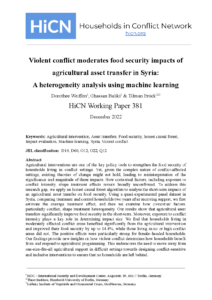Recently, crowdsourcing has been proposed as a tool for fighting misinformation online. Will internet users listen to crowdsourced fact-checking, and how? In this experiment we test how participants follow others’ opinions to evaluate the validity of a science-themed Facebook post and examine which factors mediate the use of this information. Participants observed a post presenting […]
Read More
Cardiovascular diseases are increasing at an alarming rate worldwide, reaching epidemic proportions in countries of the Eastern Mediterranean Region, including Lebanon. Despite the growing number of patients suffering from cardiovascular diseases in Lebanon, there is scarce data on whether cardiac patients adhere to therapeutic dietary guidelines, drug prescriptions, and physical activity recommendations and whether such […]
Read More
The integration of refugees into host countries’ formal labor markets is increasingly recommended as a durable solution to forced migration. Yet, this policy response is a contentious political topic with little empirical evidence, especially in low- and middle-income host countries available to support policy. This article examines the impacts of integrating Syrian refugees into Jordan’s […]
Read More
In this report we outline the null findings of a pre-registered experiment on vaccine hesitancy in the United Kingdom. The experiment targeted vaccine misconceptions common among participants by presenting a correction to such claims endorsed by a group of medical experts. The experiment had the aim to increase vaccination intention and actual uptake during the […]
Read More
This comprehensive report provides an in-depth analysis of the UNHCR’s efforts to address the needs of refugees and other displaced persons.
Read More
There is growing evidence that ethnic divisions and conflict experiences affect social capital and economic interactions in both positive and negative ways. We conduct a set of experiments measuring social capital in Kenya between the two largest ethnic groups, the Luo and Kikuyu, who experienced violence in the 2007 and 2008 post-electoral riots. Our findings […]
Read More
Homes gardens are a key source of food security and micronutrient-rich fruits and vegetables and are promoted by aid organizations to help households cope in humanitarian emergencies. However, there is a strong divide between the popularity of home gardens among practitioners and the academic evidence of its nutritional, economic, social and political outcomes. This review […]
Read More
The agricultural sector in Sudan is grappling with multiple challenges, including unpredictable rainfall patterns, outbreaks of pests and diseases, limited access to agricultural inputs, irrigation difficulties and, more recently, the onset of violence. Insufficient harvests result in food shortages and insecurity. In light of these circumstances, FAO Sudan provided emergency support to over 350,000 households […]
Read More
Globally, one in three women experience intimate partner violence (IPV) over their lifetimes. Yet, the factors that cause men to commit IPV remain poorly understood. We propose and test a causal long-term link from past exposure to gender-based collective violence to violent behavior against an intimate partner. Combining novel survey data from Angolan war veteran […]
Read More
This paper analyzes how the intersectionality of gender, forced displacement, and collective violence shapes coping behaviors in conflict crises, paying particular attention to household composition by gender and age. Drawing on survey data from 17,951 individuals in North-east Nigeria, the analysis finds that coping behaviors at the household, adult, and child levels are interlinked and […]
Read More
Methodological, ethical and practical challenges make it difficult to use experimental and rigorous quasi-experimental approaches to conduct impact evaluations in humanitarian emergencies and conflict settings (HECS). This paper discusses recent developments in the design, measurement, data and analysis of impact evaluations that can overcome these challenges and provide concrete examples from our recent research where […]
Read More
The number of vulnerable people in humanitarian emergencies worldwide is increasing due to the rising frequency and intensity of risk exposure. At the same time, most interventions in humanitarian emergency and conflict settings (HECS) are short-term in nature, as if people only require temporary help to overcome adversity. Yet there is an acute scarcity of […]
Read More
This paper investigates the relationship between state-based conflict and entrepreneurship. From a survey of the existing literature, we formulate two hypotheses: (1) state-based conflict has a negative association with productive and opportunity-motivated forms of entrepreneurship, and (2) a positive association with unproductive and necessity-motivated forms of entrepreneurship. We test these hypotheses by drawing on several […]
Read More
More than half of the adult population in the West Bank and Gaza screen positive for depression. In Gaza specifically, the rate climbs to 71%. This is shown in the new report Mental Health in the West Bank and Gaza – a joint effort by the Palestinian Central Bureau of Statistics (PCBS), the World Bank, […]
Read More
Agricultural interventions are one of the key policy tools to strengthen the food security of households living in conflict settings. Yet, given the complex nature of conflict-affected settings, existing theories of change might not hold, leading to misinterpretation of the significance and magnitude of these impacts. How contextual factors, including exposure to conflict intensity, shape […]
Read More



